What Is Your Role as a Tech Startup Founder?
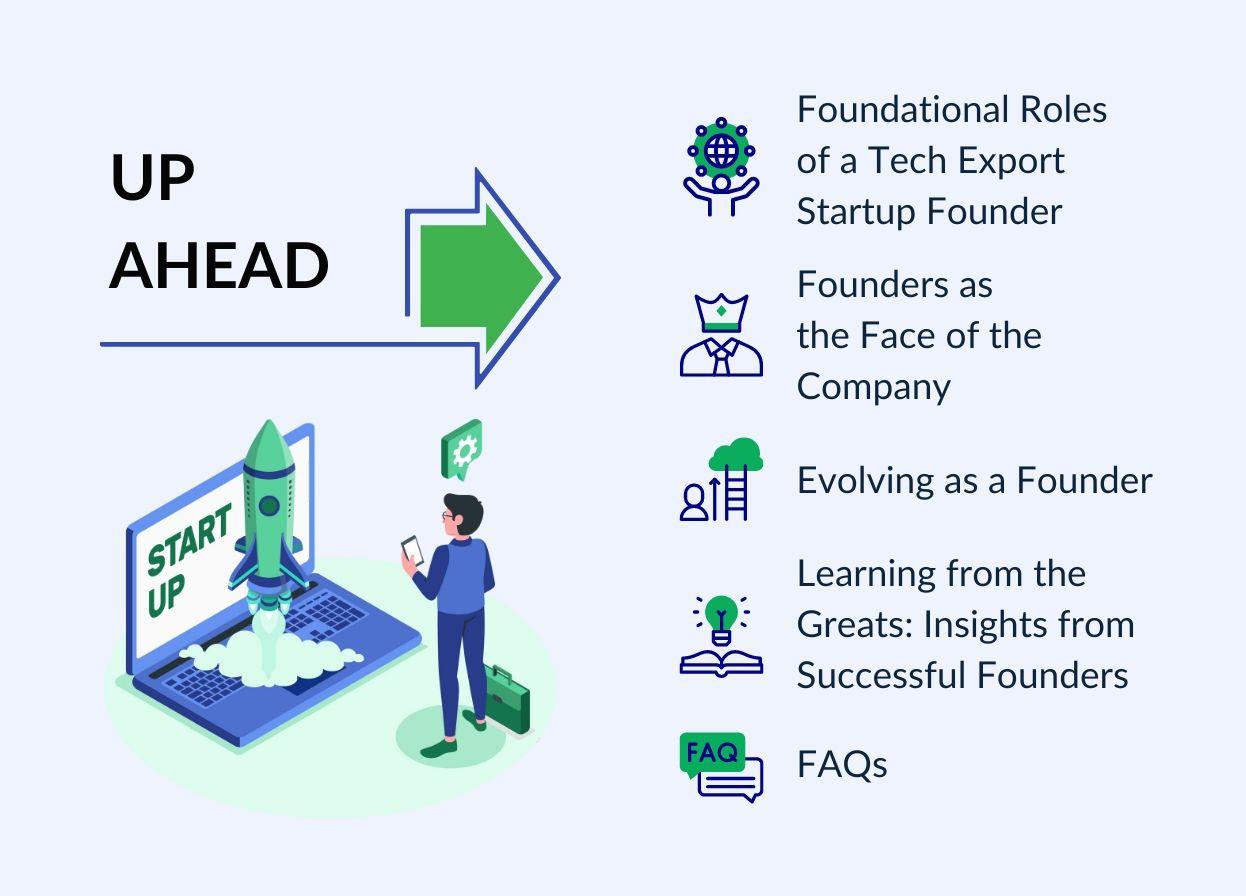

Kunal Shah. Nitin Kamat. Bhavish Aggarwal.
Many aspiring entrepreneurs and businessmen look up to these successful company founders. The persistent thought when you observe them is how can you become a successful founder yourself?
Perhaps, you should start early at 19 years like Ritesh Agarwal of OYO? After all, he did build one of the world's largest hotel chains, operating across multiple countries. Deepinder Goyal scaled Zomato to over 25 countries. He focused on setting the long-term strategic direction and identifying growth opportunities in international markets. You can do both or none.
In the realm of tech export businesses, innovation, and global reach are at the forefront. Thus, founders play a critical role in navigating the complexities of international markets. But how can you achieve this?
Here’s a list of specific roles and responsibilities that successful founders embrace. These are the open secrets to entrepreneurial triumph.
Foundational Roles of a Tech Export Startup Founder
In your tech startup’s early stages, you find yourself juggling multiple roles. Given the resource restraints, you must manage them and do it well. These roles include the following.
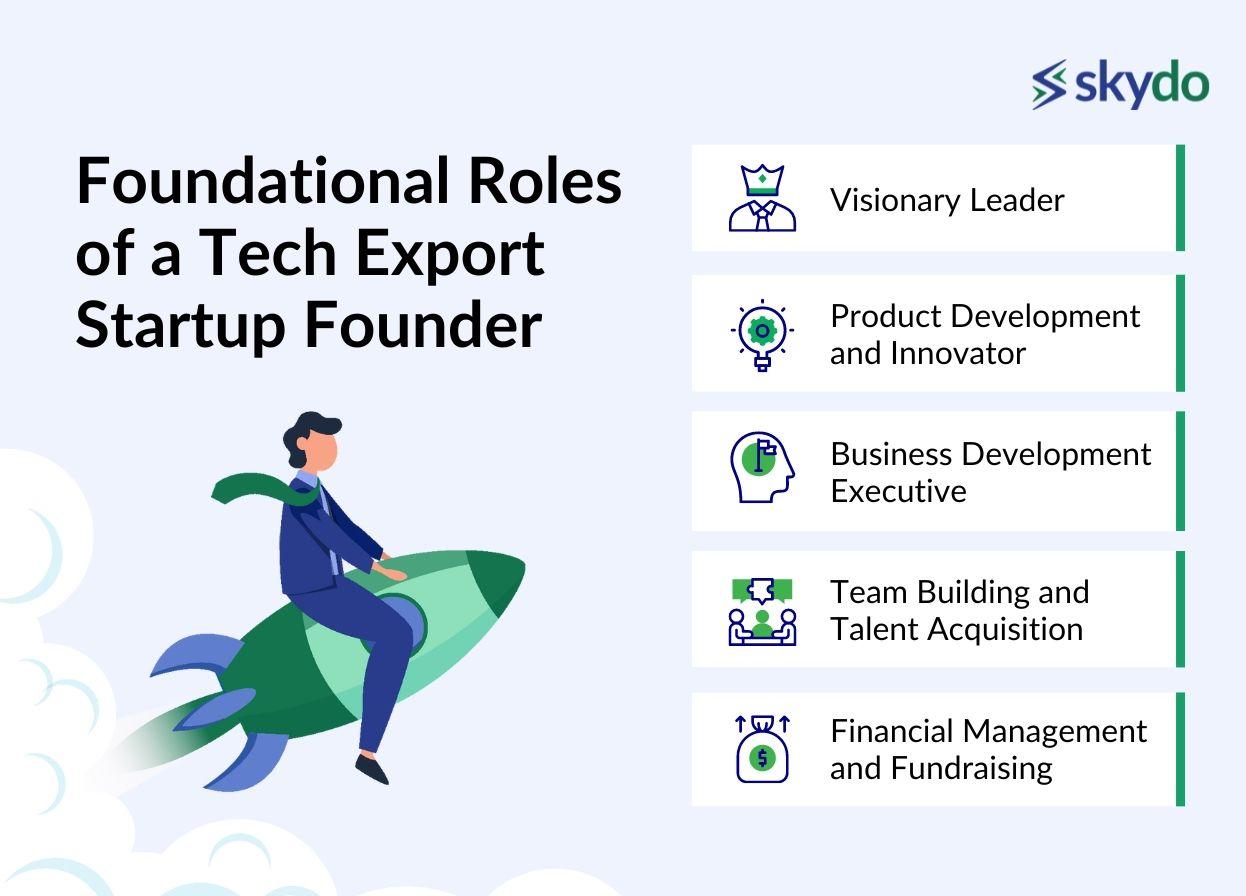
- Visionary Leader: This role includes providing a clear vision by defining the company's mission, values, and long-term goals. You also need to create a comprehensive strategy to execute this vision in the right direction. Doing so ensures you inspire and motivate the team to work towards a common objective.
- Product Development and Innovator: A successful company innovates constantly. In this role, you must understand market needs and translate them into innovative solutions to keep the business momentum going. This way, you meet the needs of your target market and stand out from the competition.
- Business Development Executive: As a business developer, your role includes identifying and pursuing new market opportunities. You will also put your network to the test and identify the ability to build strategic partnerships, negotiate deals, and navigate international markets. These steps play a pivotal role in establishing the startup's presence in global markets, driving growth, and ensuring long-term success in the tech export industry.
- Team Building and Talent Acquisition: Since you set the culture, you can better identify good fits for your success. As the non-HR HR, you must lead the recruitment process, create a positive work culture, define roles and responsibilities, and empower team members to perform at their best.
- Financial Management and Fundraising: Although consultants guide you, only you have skin in the game. You must create a viable business model, manage budgets, and seek funding opportunities. Whether planning financial strategy, pitching to investors or securing funding, don’t take your eye off the numbers.
By wearing many hats, you will gain a deep understanding of all verticals, enabling you to better train your second line of leaders in the future. Moreover, the willingness to embrace different roles instils a sense of resourcefulness and agility, enabling you to pivot when necessary.
Let’s understand how you can execute some of these roles in detail.
1. Setting the Vision and Strategy
The vision represents your startup’s long-term aspirations and purpose. It will influence every decision you make and give direction.
Generally, founders craft a roadmap and approach to realising the vision by analysing the competitive landscape, identifying target markets, and defining the company’s unique value proposition.
This Forbes article is useful for creating a step-by-step vision.
A well-crafted strategy to execute this vision statement provides a framework for decision-making, resource allocation, and prioritisation, ensuring your startup moves toward its vision with purpose and focus.
2. Building and Leading the Team
A talented and dedicated team is the driving force behind achieving ambitious goals and surpassing expectations. Michael Gurdley’s Twitter thread sums it up quite well. Founders must fulfil this crucial role by building a cohesive and high-performing team.
Here’s how you can hire right.
- Define Roles and Responsibilities: For each team member to ensure a well-structured organisation.
- Hire for Cultural Fit: Culture eats strategy for breakfast. Look for individuals who align with your values and mission.
- Seek Diverse Skill Sets: Assemble a team with diverse skills and perspectives to tackle challenges from different angles.
- Prioritise Passion and Potential: Look beyond experience and consider candidates with passion, curiosity, and a growth mindset. They have the potential to adapt and contribute to your startup's growth.
- Hire internally: If you feel associates can step up as managers, promote them. They know your company and product better than outsiders and can hit the ground running.
Once you have a team, it is time to lead them well. The following tips will help you sustain your team members.
- Lead by Example: Set the tone for the company's culture by embodying the values and behaviours you wish to see in the team.
- Encourage Open Communication: Encourage Open Communication: If your team members are afraid of you and feel uncomfortable sharing ideas, concerns, and feedback, your business will eventually fail. Encourage active listening and open dialogue, and use a Canva memo to share important updates or decisions with the team.
- Promote Collaboration: Support cross-functional collaboration, teamwork, and knowledge sharing. Break down silos and foster a sense of camaraderie among team members.
- Recognise and Celebrate Achievements: People love being acknowledged and celebrated. Recognising their hard work and effort fosters a positive and motivating work atmosphere.
3. Fundraising and Financial Management
Speakers like Simon Sinek have repeatedly professed that money is the fuel that enables businesses to reach their goals. Ashneer Grover’s book Doglapan further supports this statement and explains how a large part of his work growing BharatPe (and now Third Unicorn) is securing funding - round after round.
If you need to raise funds for your business, follow these tips to get started.
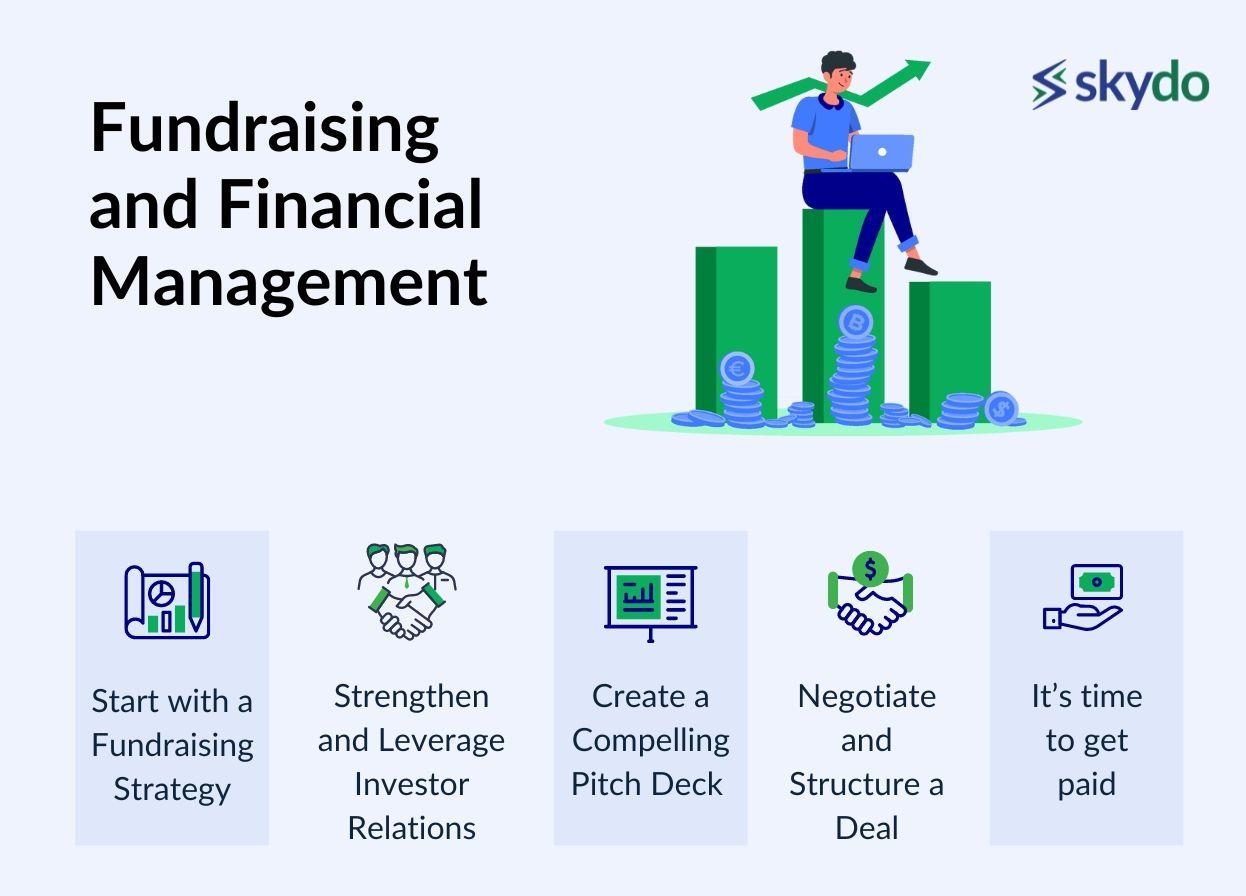
- Start with a Fundraising Strategy: You need to develop a strategic approach to fundraising, including identifying potential investors, creating compelling pitch materials, and presenting the startup's value proposition to secure funding.
- Strengthen and Leverage Investor Relations: You need to build and maintain strong relationships with investors, provide regular updates on the company's progress, address their concerns, and seek their guidance and support.
- Create a Compelling Pitch Deck: Create a pitch deck that highlights the startup's unique value proposition, market opportunity, business model, financial projections, and team. These pitch decks serve as a persuasive tool to attract investors and secure funding.
- Negotiate and Structure a Deal: You need to negotiate investment terms and deal structures with potential investors. Assess the financial and strategic implications of different offers, secure favourable terms that align with your startup's objectives and ensure a fair valuation.
- It’s Time to Get Paid: This step includes driving the execution of the fundraising process, managing timelines, coordinating investor meetings, and overseeing the legal and administrative aspects of closing investment deals. Consult with your legal and financial advisors to ensure compliance and smooth transactions.
Bootstrapping and Alternative Funding Sources:
In addition to external investments, alternative funding sources such as grants, accelerators, or crowdfunding help you get cash without diluting equity. Assess the viability of these options and use them wherever possible.
Regardless of your source of funding (investor or bootstrapped), regular financial management is crucial. These vital steps include the following.
- Review Your Finances: Monitor and manage financial resources, ensure that spending is optimised, and your financial goals are met. A weekly meeting with your finance and accounts team is recommended.
- Manage Cash Flow: Prioritise cash flow management to ensure the availability of funds for day-to-day operations, paying suppliers, and meeting financial obligations.
- Financial Reporting and Analysis: Make data-driven decisions, identify areas for improvement, and communicate financial information to stakeholders.
- Long-term Financial Sustainability: This is the final pillar. Keep checking if your decisions align with the startup's long-term financial viability and scalability.
4. Nurturing Customer and Business Relationships
Customer service is everybody’s job - including the founder. Elon Musk is famous for addressing customer complaints himself. Similarly, many organisations like Basecamp have policies to have everyone work in customer service roles for a few days every year.
In the global landscape of tech exports, establishing trust, understanding diverse cultures, and delivering exceptional customer experiences are essential for success. Founders can do three things to help their case:
- Engage with customers to understand their needs, preferences, and pain points.
- Go beyond NPS surveys and take detailed feedback to understand if your products/services deliver value and meet expectations.
- Create a trusteeship mindset. Act as customer advocates, representing their interests within the company.
In fact, the father of capitalism, Adam Smith, writes in his book Wealth of Nations:
“We only need to attend to the recipient of our product or service, and the interests of the company should come second. That maxim is so perfectly self-evident that it would be absurd to attempt to prove it.”
Founders as the Face of the Company

Founders of tech export startups often serve as the public face of their companies, playing a crucial role in marketing and sales efforts. Your personal brand and reputation will impact the company's image and future. Here’s how.
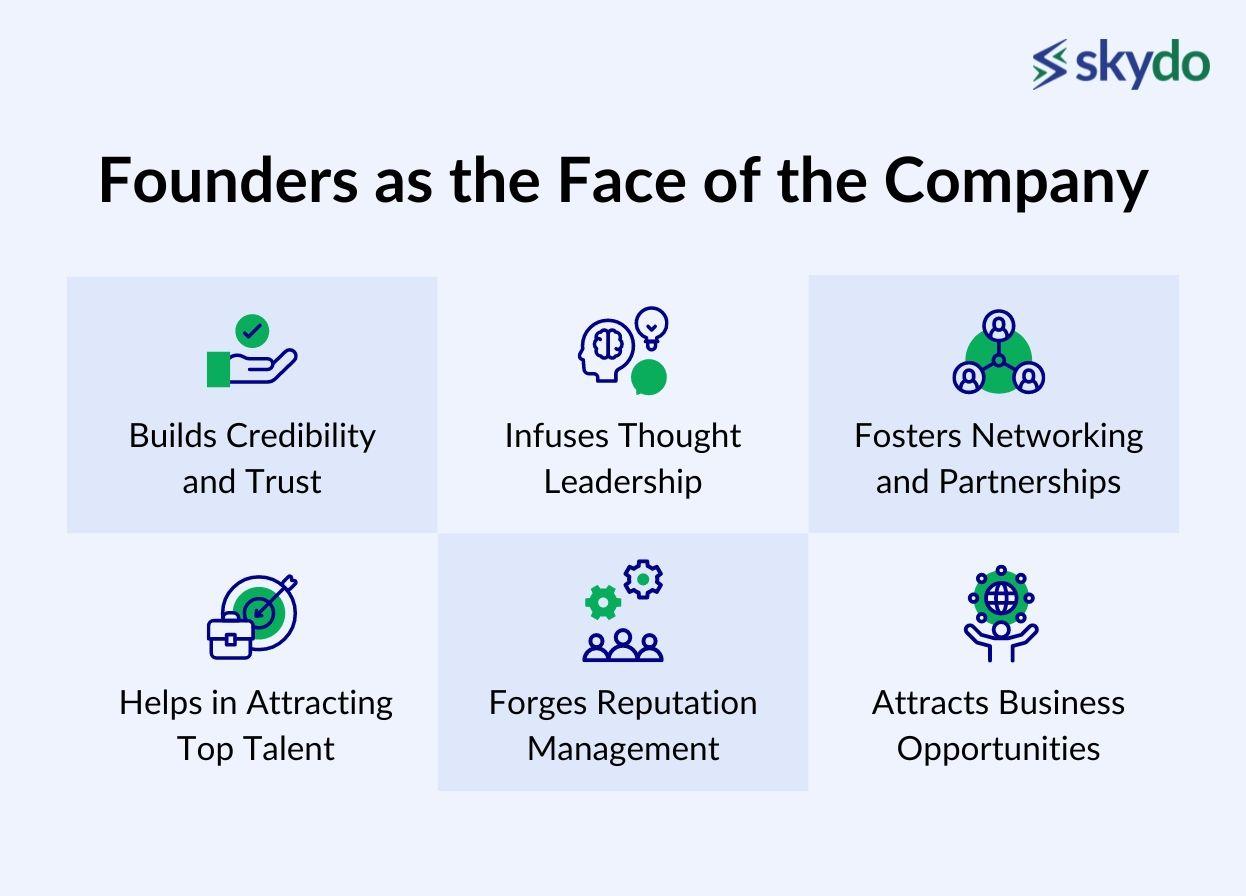
- Builds Credibility and Trust: A strong personal brand instils confidence and trust in potential stakeholders.
- Infuses Thought Leadership: A founder's expertise positions the company as an industry authority, attracting business opportunities.
- Fosters Networking and Partnerships: A well-connected founder can leverage their personal brand for valuable collaborations and partnerships.
- Helps in Attracting Top Talent: A reputable founder's personal brand appeals to talented professionals, aiding recruitment efforts.
- Forges Reputation Management: The founder's personal brand helps manage and enhance the company's reputation during challenges.
- Attracts Business Opportunities: A strong personal brand attracts clients, partnerships, media coverage, and investment opportunities.
Evolving as a Founder
As the human species evolved with time, founders must evolve as the business grows and faces new challenges. You must adapt, learn, and develop your skills to effectively lead the company. Follow these tips to evolve as a founder.
- Stay ahead of emerging trends, technologies, and market dynamics.
- Subscribe to industry newsletters, participate in seminars, and engage with virtual communities - even if it is a Slack channel or LinkedIn group.
- Learn through books (recommendations in the next section, podcasts, people, and experiences. Newsletters like 3-2-1 Thursday by James Clear are quite good.
- Cultivate habits such as reading, journaling, mindfulness, or physical exercise. These practices can enhance mental well-being, foster creativity, and support personal growth as a founder.
Learning from the Greats: Insights from Successful Founders
Some of the greats shared their wisdom on how to cultivate the right mindset to run a business. Let’s understand their mindsets that created successful organisations.
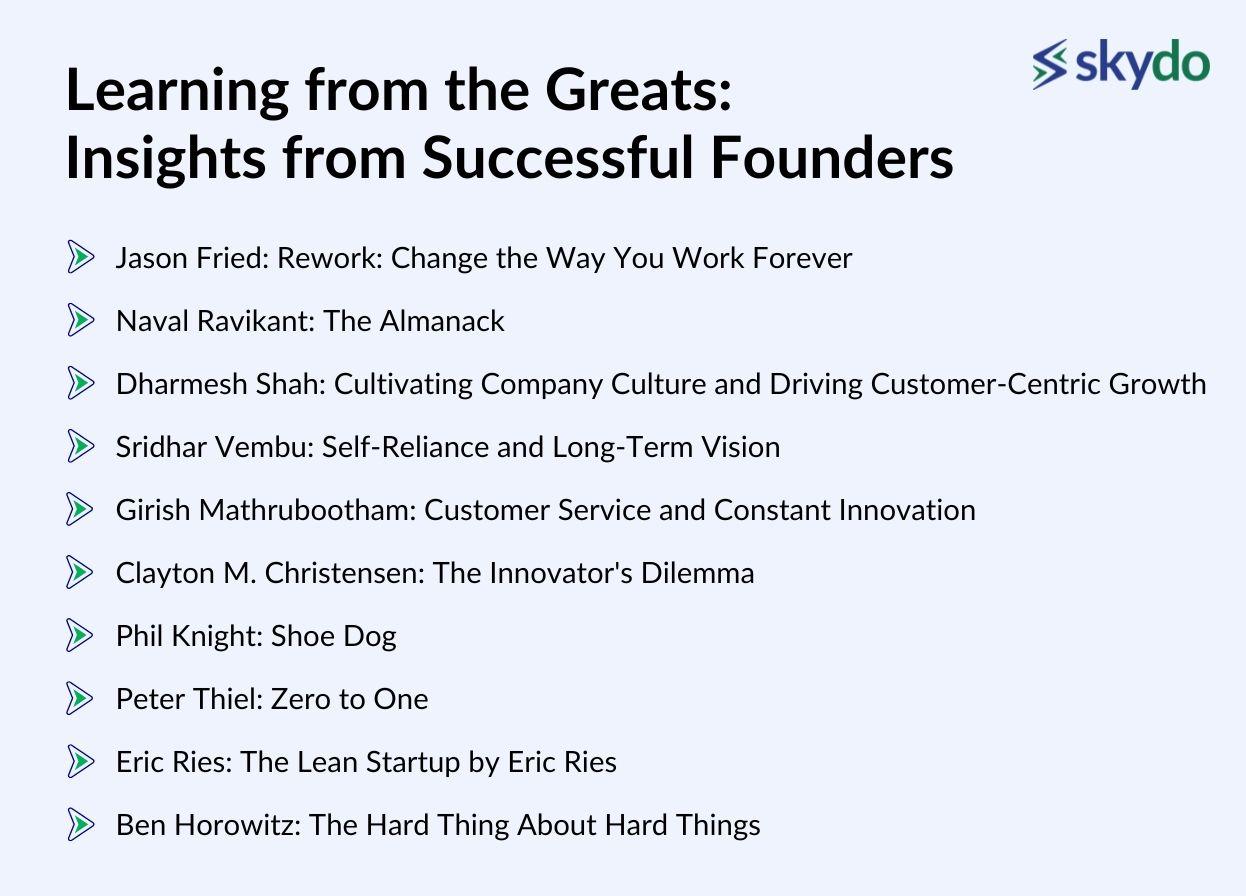
1. Jason Fried: Rework: Change the Way You Work Forever
Authored by the co-founder of Basecamp, he explains how minimising distractions and providing ample time for deep work enables teams to produce high-quality outcomes.
2. Naval Ravikant: The Almanack
A successful angel investor, Naval emphasises bootstrapping and creating a cash flow-positive business rather than relying solely on external funding.
3. Dharmesh Shah: Cultivating Company Culture and Driving Customer-Centric Growth
Dharmesh emphasises that the company's values must align with its actions, fostering transparency.
4. Sridhar Vembu: Self-Reliance and Long-Term Vision
The Zoho founder advocates for minimising dependencies on external factors, such as venture capital, and focusing on building a sustainable business that can weather market fluctuations.
5. Girish Mathrubootham: Customer Service and Constant Innovation
The co-founder of Freshworks focuses on providing exceptional customer experiences as the foundation of building a successful tech export startup.
6. Clayton M. Christensen: The Innovator's Dilemma
This book explores the challenges companies face in disruptive innovation and how to navigate them.
7. Phil Knight: Shoe Dog
This memoir by the co-founder of Nike offers insights into entrepreneurship, perseverance, and building a global brand.
8. Peter Thiel: Zero to One
The author, a German-American billionaire entrepreneur and venture capitalist, provides insights on startups, innovation, and building successful businesses.
9. Eric Ries: The Lean Startup by Eric Ries
This American entrepreneur focuses on lean principles, experimentation, and rapid iteration in startups.
10. Ben Horowitz: The Hard Thing About Hard Things
As an American businessman and investor, Ben offers practical advice on navigating the challenges of building and leading a startup.
Incorporating these insights into your tech startup can contribute to developing a strong foundation and a path toward long-term success.
Frequently Asked Questions
Q1. How can a founder set a clear vision and strategy for their startup?
Ans: A founder can set a clear vision and strategy for their startup by defining core values, understanding market needs, and fostering a collaborative team culture. Regularly reassessing goals and staying adaptable ensures alignment with evolving business landscapes.
Q2. What is the significance of team building for a startup founder?
Ans: Team building is crucial for a startup founder as it fosters a collaborative environment, enhances communication, and aligns the team with the company's vision. A cohesive team is more resilient and innovative, driving the startup's success.
Q3. How can founders evolve and adapt as their startups grow?
Ans: Founders can evolve and adapt as their startups grow by staying open to feedback, continuously learning, and delegating tasks effectively. Embracing change, staying agile, and fostering a culture of innovation are key to navigating the challenges of growth.
Q4. What role do founders play in customer service and relationship management?
Ans: Founders play a pivotal role in customer service and relationship management by setting the tone for customer-centricity, gathering feedback, and addressing concerns. Building strong customer relationships not only fosters loyalty but also contributes to the startup's reputation and long-term success.












